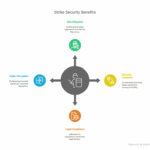In today’s rapidly evolving business landscape, companies face a myriad of challenges in managing their workforce. From talent shortages and high turnover rates to the complexities of compliance and the demand for specialized skills, the pressures on human resource departments are immense. One strategic solution that has gained significant traction is the outsourcing of labor. Leveraging third-party employment services offers a viable way to overcome these challenges, providing businesses with the flexibility, expertise, and efficiency needed to thrive. This article delves into the critical role of outsourcing labor, examining its benefits, potential drawbacks, and the various ways it can be implemented to address modern workforce issues.
Understanding Outsourcing Labor
Outsourcing labor involves contracting external agencies or third-party service providers to handle certain business functions or tasks that were traditionally managed in-house. This can range from temporary staffing and recruitment to specialized services like IT support, customer service, and administrative tasks. The primary objective is to leverage the expertise and resources of third-party providers to enhance operational efficiency and focus on core business activities.
Benefits of Outsourcing Labor
Access to Specialized Talent
One of the most compelling reasons for outsourcing labor is access to specialized talent. In many industries, finding skilled professionals with the required expertise can be challenging. Third-party employment services often have extensive networks and databases of qualified candidates, enabling businesses to quickly fill critical roles with the right talent. This is particularly beneficial for sectors that require niche skills or expertise that may not be readily available in the local job market.
Flexibility and Scalability
Outsourcing labor provides businesses with the flexibility to scale their workforce up or down based on demand. This is especially valuable for companies with seasonal fluctuations or project-based work. By leveraging third-party personnel, businesses can efficiently manage their labor needs without the long-term commitment and overhead costs associated with hiring full-time employees. This flexibility allows companies to remain agile and responsive to changing market conditions.
Cost Efficiency
Outsourcing labor can lead to significant cost savings. By partnering with third-party providers, businesses can reduce expenses related to recruitment, training, benefits, and payroll management. Additionally, outsourcing can lower overhead costs by eliminating the need for additional office space and equipment. These cost efficiencies enable companies to allocate resources more effectively and invest in strategic initiatives that drive growth.
Focus on Core Competencies
By outsourcing non-core functions, businesses can focus on their core competencies and strategic objectives. This shift in focus allows internal teams to concentrate on activities that directly contribute to the company’s competitive advantage and long-term success. Outsourcing administrative and repetitive tasks frees up valuable time and resources, fostering innovation and improving overall productivity.
Compliance and Risk Management
Navigating the complexities of labor laws and regulations can be daunting for businesses. Third-party employment services have the expertise and resources to ensure compliance with local, state, and federal regulations. This includes managing payroll, taxes, benefits, and employment contracts. By outsourcing these responsibilities, companies can mitigate the risk of non-compliance and avoid costly legal issues.
Addressing Workforce Challenges with Third-Party Personnel
Mitigating Talent Shortages
Talent shortages are a significant challenge for many industries, particularly those requiring highly specialized skills. Third-party personnel agencies have the infrastructure and reach to source talent from a broader pool, including remote or international candidates. This expanded access helps businesses overcome local talent shortages and find the expertise needed to drive innovation and growth.
Enhancing Recruitment and Retention
High turnover rates can be detrimental to business continuity and morale. Third-party employment services can enhance recruitment and retention by providing targeted staffing solutions. These agencies employ experienced recruiters who understand industry-specific needs and can match candidates with the right roles. Additionally, they offer support services such as onboarding, training, and career development, which contribute to higher employee satisfaction and retention.

Managing Seasonal and Project-Based Workloads
Many businesses experience seasonal peaks or project-based workloads that require temporary staffing solutions. Outsourcing labor through third-party providers allows companies to manage these fluctuations effectively. Temporary staffing agencies can supply qualified personnel on short notice, ensuring that businesses have the workforce needed to meet increased demand without the long-term commitment of permanent hires.
Improving Operational Efficiency
Third-party employment services bring a wealth of experience and best practices to the table. By leveraging their expertise, businesses can streamline operations, implement efficient workflows, and improve overall productivity. These providers often use advanced technology and tools to enhance recruitment, onboarding, and workforce management processes, resulting in faster turnaround times and higher-quality outcomes.
Potential Drawbacks of Outsourcing Labor
While outsourcing labor offers numerous benefits, it is essential to consider potential drawbacks and challenges:
Loss of Control
Outsourcing certain functions may result in a perceived loss of control over business processes. Companies must rely on third-party providers to deliver quality services and maintain performance standards. Effective communication and robust contractual agreements are crucial to mitigating this risk and ensuring alignment with business objectives.
Security and Confidentiality Concerns
Outsourcing labor involves sharing sensitive business information with external parties. This can raise concerns about data security and confidentiality. To address these issues, businesses should implement strict data protection policies, conduct thorough due diligence on potential providers, and establish clear confidentiality agreements.
Integration and Coordination Challenges
Integrating third-party personnel into existing teams and workflows can be challenging. Differences in organizational culture, communication styles, and work practices may lead to coordination issues. Businesses must invest time and effort in building strong relationships with their outsourcing partners, fostering collaboration, and aligning expectations.
Implementing Effective Outsourcing Strategies
Choosing the Right Partner
Selecting the right third-party employment service provider is critical to the success of outsourcing initiatives. Businesses should consider factors such as industry expertise, track record, range of services, and client testimonials. Conducting thorough research and due diligence will help identify providers that align with the company’s needs and values.
Defining Clear Objectives and Expectations
Clear communication of objectives and expectations is essential for a successful outsourcing partnership. Businesses should establish detailed contractual agreements outlining the scope of work, performance metrics, timelines, and accountability. Regular review meetings and performance evaluations can help ensure that both parties are on the same page and working towards common goals.
Investing in Relationship Management
Building a strong, collaborative relationship with outsourcing partners is crucial for long-term success. This involves regular communication, feedback, and mutual support. Businesses should foster a culture of transparency and trust, encouraging open dialogue and problem-solving. Investing in relationship management can lead to improved performance, innovation, and a more seamless integration of third-party personnel.
Embracing Technology
Leveraging technology is key to optimizing outsourcing arrangements. Advanced software and tools can enhance communication, streamline workflows, and provide real-time data on performance and productivity. Businesses should invest in technology solutions that facilitate collaboration and integration with third-party providers, ensuring a smooth and efficient outsourcing process.
Strategic Outsourcing Models
Project-Based Outsourcing
Project-based outsourcing is a model where businesses contract third-party providers to complete specific projects or tasks within a defined timeframe. This approach is particularly useful for businesses that require specialized skills for short-term projects or initiatives that do not justify hiring permanent employees. Project-based outsourcing allows companies to tap into a pool of experts who can deliver high-quality results efficiently and cost-effectively.
Benefits of Project-Based Outsourcing:
Expertise: Access to highly skilled professionals with specific expertise relevant to the project.
Cost Control: Clearly defined budgets and timelines help manage costs effectively.
Flexibility: The ability to scale resources up or down based on project needs without long-term commitments.
Focus: Internal teams can concentrate on core business activities while the outsourced team handles the project.
Managed Services
Managed services involve a more ongoing relationship between businesses and third-party providers. In this model, the provider takes over the responsibility for managing certain functions or processes, such as IT services, HR functions, or customer support. Managed services are ideal for businesses looking to improve efficiency and service quality while reducing the burden on internal teams.
Benefits of Managed Services:
Efficiency: Providers use standardized processes and best practices to deliver consistent, high-quality services.
Scalability: Easily scalable services to meet changing business needs.
Predictable Costs: Fixed monthly fees or service-level agreements (SLAs) provide predictable budgeting.
Expert Management: Providers offer experienced management and support, often including advanced technology and tools.
The Role of Technology in Enhancing Outsourcing Efficiency
Advanced Recruitment Technologies
Modern technology has revolutionized the recruitment process, making it more efficient and effective. Third-party employment services leverage advanced recruitment technologies, including artificial intelligence (AI) and machine learning (ML), to streamline candidate sourcing, screening, and selection. These technologies enable providers to quickly identify the best candidates from large talent pools, ensuring a faster and more accurate hiring process.
Benefits of Advanced Recruitment Technologies:
Speed: Accelerates the recruitment process by automating repetitive tasks.
Accuracy: Enhances candidate matching by using data-driven insights and predictive analytics.
Reach: Expands access to a global talent pool through online platforms and social media.
Candidate Experience: Improves the candidate experience with user-friendly application processes and timely communication.
Collaboration and Communication Tools
Effective communication and collaboration are crucial for the success of outsourcing partnerships. Third-party providers utilize various collaboration and communication tools to ensure seamless interaction between their teams and the client’s internal teams. Tools such as project management software, video conferencing platforms, and collaborative workspaces facilitate real-time communication, document sharing, and project tracking.
Benefits of Collaboration and Communication Tools:
Transparency: Enhances visibility into project progress and performance metrics.
Efficiency: Streamlines workflows and reduces the time spent on meetings and emails.
Alignment: Ensures that all stakeholders are aligned and informed about project goals and timelines.
Flexibility: Supports remote and flexible working arrangements, making it easier to collaborate across different time zones and locations.
The Future of Outsourcing Labor
The trend towards outsourcing labor is expected to continue as businesses seek ways to navigate the complexities of the modern workforce. Advances in technology, the growing importance of flexibility, and the need for specialized skills will drive the demand for third-party employment services. Companies that embrace outsourcing as a strategic tool will be better positioned to adapt to changing market conditions, drive innovation, and achieve sustainable growth.
Outsourcing labor through third-party employment services offers a powerful solution to many of the workforce challenges faced by businesses today. From accessing specialized talent and enhancing operational efficiency to managing compliance and reducing costs, the benefits are substantial. However, successful outsourcing requires careful planning, clear communication, and a strong partnership with the right provider. By implementing effective outsourcing strategies, businesses can unlock new opportunities, drive performance, and remain competitive in an ever-evolving landscape.
FAQs
What types of tasks can be outsourced to third-party employment services?
Businesses can outsource a wide range of tasks, including temporary staffing, recruitment, IT support, customer service, administrative tasks, and specialized services such as compliance management and payroll processing.
How do third-party employment services help with compliance?
Third-party providers have expertise in labor laws and regulations, ensuring that all HR processes, including payroll, taxes, benefits, and employment contracts, comply with local, state, and federal laws. This reduces the risk of non-compliance and legal issues.
What are the main benefits of outsourcing labor?
The main benefits include access to specialized talent, flexibility and scalability, cost efficiency, focus on core competencies, and improved compliance and risk management.
How can businesses ensure the security and confidentiality of their data when outsourcing?
Businesses should implement strict data protection policies, conduct thorough due diligence on potential providers, and establish clear confidentiality agreements to safeguard sensitive information.
What should companies consider when selecting a third-party employment service provider?
Companies should consider factors such as the provider’s industry expertise, track record, range of services, client testimonials, and ability to align with the company’s needs and values. Conducting thorough research and due diligence is essential.









